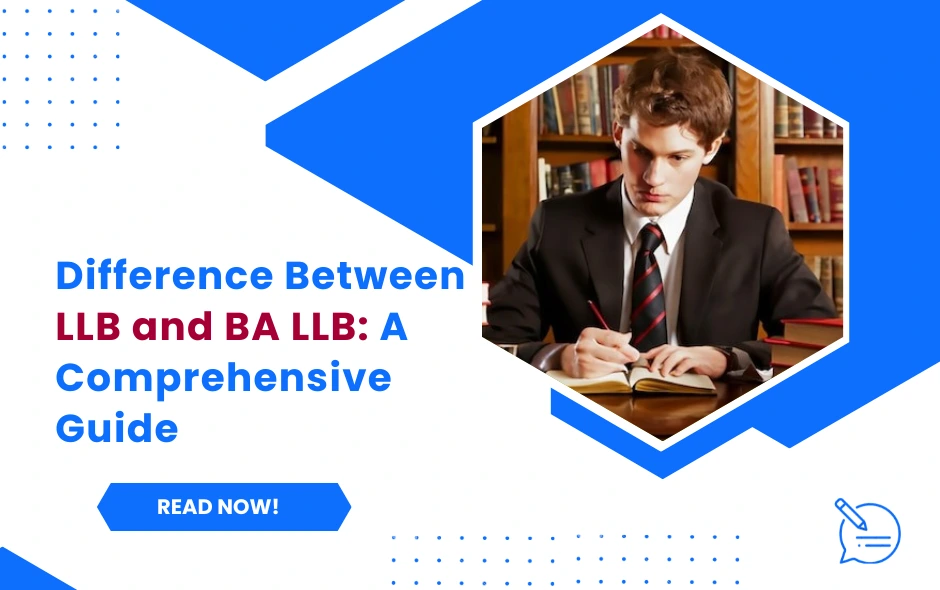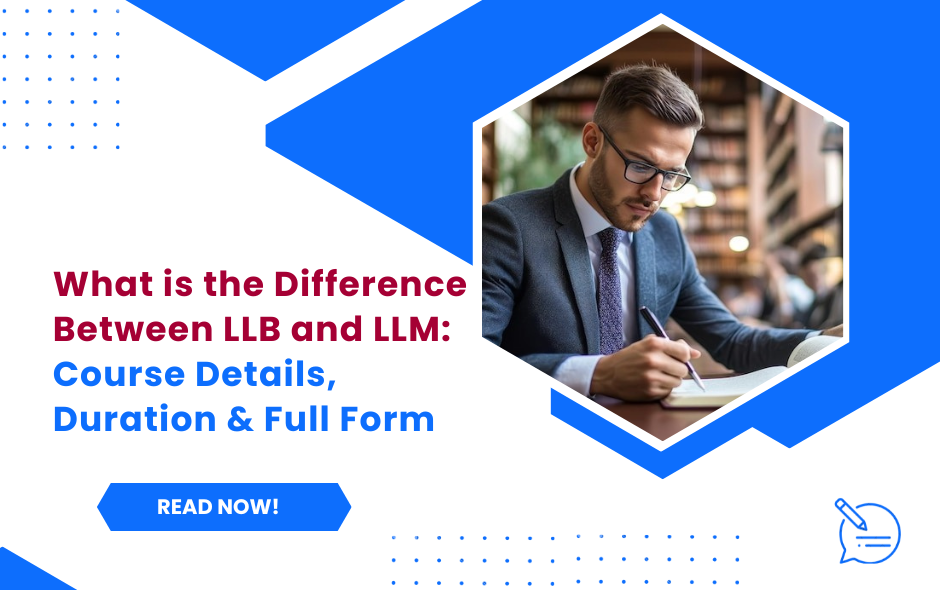Law Courses After 12th: What You Need to Know
Have you ever dreamt of arguing a case in court, upholding justice, or working to change laws for the better? The world of law offers a dynamic and challenging career path, and the exciting journey starts right after your 12th grade with Law Courses After 12th!
This blog is your one-stop guide to navigating this crucial first step. We'll delve into the different Law Courses After 12th available, eligibility criteria, and how to kickstart your legal dream.
So, buckle up, aspiring legal eagles! Let's build your future in law, one course at a time.
What is a Law Course?
A Law Course is an academic program designed to equip you with the knowledge and skills necessary to understand and navigate the legal system. These programs are offered at various levels, from undergraduate degrees to postgraduate studies and even doctoral programs.
Here's a breakdown of what you can expect from a Law Course:
Comprehensive Knowledge: You'll gain a strong foundation in legal principles, covering areas like criminal law, civil law, property law, and constitutional law. The specific courses will vary depending on the program and your area of interest.
Analytical Skills: Law Courses hone your ability to analyse complex legal issues, identify relevant information, and apply legal reasoning to real-world scenarios. This critical thinking is essential for interpreting laws and regulations.
Communication Skills: Effective communication is paramount in the legal field. Law Courses will help you develop strong written and verbal communication skills, allowing you to present arguments persuasively and clearly.
Research Skills: Legal professionals rely heavily on research to build strong cases. Law Courses will equip you with the skills to research legal topics effectively, find relevant case law, and analyse legal precedents.
Overall, a Law Course prepares you for a successful career in the legal field, but it can also be valuable outside of law practice. The skills you develop in critical thinking, communication, and research are transferable to many different professions.
Integrated Law Courses After 12th
Bachelor of Arts LLB (BA LLB)
A Bachelor of Arts and Bachelor of Laws (BA LLB) is a five-year integrated program that combines a traditional Arts degree with legal studies. This program allows you to explore subjects like history, sociology, or economics alongside core law courses, giving you a well-rounded foundation while preparing you for a career in law.
Bachelor of Commerce LLB (BCom LLB)
The Bachelor of Commerce and Bachelor of Legislative Law(BCom LLB ) is a unique five-year integrated program that combines business studies with legal education. This means you'll gain a strong foundation in commerce subjects like accounting and economics alongside core legal principles, preparing you for careers at the intersection of business and law.
Bachelor of Business Administration LLB (BBA LLB)
A Bachelor of Business Administration and Bachelor of Legislative Law (BBA LLB) is a five-year integrated program that merges business studies with legal education. You'll gain a solid foundation in business principles like accounting, finance, and marketing, alongside core law subjects like contracts, property law, and constitutional law, preparing you for a career at the intersection of business and law.
Bachelor of Social Work LLB (BSW LLB)
The Bachelor of Social Work and Legislative Law (BSW LLB) is a unique five-year integrated program that combines social work studies with legal training. It equips you with an understanding of social issues and the legal tools to address them, making you a well-rounded advocate for social justice and legal rights.
Bachelor of Technology LLB (BTech LLB)
The Bachelor of Technology and Bachelor of Legislative Law (BTech LLB) is a unique six-year integrated program for students who want to combine their interest in technology with a legal background. During the first few years, you'll delve into engineering disciplines, followed by a deep dive into law studies, equipping you to handle legal issues specifically related to the ever-evolving world of technology.
Bachelor of Legal Science LLB (BLS LLB)
The Bachelor of Legal Science and Bachelor of Legislative Law (BLS LLB) is a five-year integrated program designed for students entering straight from high school. The first two years provide a foundation in law-related social sciences, followed by in-depth legal studies and practical training, culminating in the award of both the BLS and LLB degrees upon graduation.
Bachelor of Science LLB (BSc LLB)
The Bachelor of Science and Bachelor of Legislative Law (BSc LLB) is a unique five-year integrated program. It combines a science background in fields like physics, chemistry, or biotechnology with a strong legal foundation. This program caters to students who are passionate about science but also see themselves in a law-related career, giving them a unique perspective for tackling legal issues with a scientific bent.
Diploma Law Courses After 12th
Diploma courses in law after class 12 provide focused legal training in specific areas like cyber law or taxation for quicker career entry. Here is the comprehensive list of courses:
- Diploma in Criminal Law
- Diploma in Business Law
- Diploma in Corporate Law & Management
- Diploma in Cyber Law
- Diploma in Criminology
- Diploma in Human Rights Law
- Diploma in Information Technology Laws
- Diploma in Labour Laws
- Diploma in Taxation Laws
Certification Law Courses After 12th
- Certification Course in Cyber Law
- Certification Course in Business Law
- Certification Course in Corporate Law
- Certification Course in Anti-Human Trafficking
- Certification Course in Insurance Law
- Certification Course in Human Rights
- Certification Course in Consumer Protection
Law Courses After 12th - Eligibility Criteria
The eligibility criteria for Law Courses After 12th can vary depending on the specific program (integrated vs. LLB) and the university/institution offering it. However, here's a general overview:
Educational Qualification: You must have passed your Class 12 exams from a recognised board.
Minimum Marks: The minimum marks requirement typically ranges from 45% to 50% aggregate marks in Class 12. Some universities may have a higher cut-off for competitive programs. There may be relaxation for reserved categories (SC/ST/OBC).
Entrance Exams: Many universities require you to appear for Law Entrance Exams like CLAT, LSAT-India, AILET, etc., for admission to prestigious programs.
Age Limit: There's usually no upper age limit for pursuing Law Courses After 12th.
Additional Considerations:
Some integrated law programs may have specific subject requirements in Class 12 (e.g., Maths for a BSc LLB).
A good academic record and strong performance in relevant subjects like Social Science or English can be beneficial.
Remember: It's always best to check the specific admission requirements for the program and university you're interested in.
Admission Process For Law Courses After Class 12th
The admission process for Law Courses After 12th can vary slightly depending on the university and program type (integrated vs. LLB), but here's a general roadmap:
Research and Choose Your Program: Explore different Law Courses After 12th options (integrated vs. LLB, specific specialisations) and identify universities that align with your career goals. Consider factors like program curriculum, faculty reputation, and placement record.
Check Eligibility: Ensure you meet the basic eligibility criteria (passed Class 12 with minimum marks) and any specific subject requirements for the chosen program.
Entrance Exams (if applicable): Many universities require Law Entrance Exams like CLAT, LSAT-India, or AILET for admission. Register for the relevant exam, prepare diligently, and score competitively.
University Application: Fill out the application form for your chosen university, typically online or offline. Submitting required documents like mark sheets, entrance exam scores, and character certificates is crucial.
Selection Process: Universities may shortlist candidates based on entrance exam scores, Class 12 marks, or additional processes like personal interviews (for some programs).
Counselling and Admission: Shortlisted candidates may attend counselling sessions for seat allocation based on merit and preferences. Once a seat is confirmed, complete admission formalities and fee payment.
Careers Opportunities After Pursuing Law Courses
The legal field offers a diverse and exciting landscape for aspiring graduates. Having a law degree under your belt opens doors to a multitude of career paths, each with its own unique challenges and rewards. Here's a glimpse into some of the most sought-after opportunities after pursuing Law Courses:
Traditional Legal Practice:
- Litigator
- Judge
- Corporate Lawyer
- Criminal Lawyer
Beyond the Courtroom:
- Legal Advisor
- Legal Researcher
- Compliance Officer
- Law Professor
Emerging Fields:
- Cybersecurity Lawyer
- Sports Lawyer
- Entertainment Lawyer
Beyond Law Practice:
- Politics
- Business
- Non-Profit Sector
Remember, this is just a starting point. The legal field is constantly evolving, and new career opportunities are emerging all the time. With a strong foundation in law and a willingness to explore, the possibilities are endless!
Law Courses After 12th at CGC Jhanjeri can equip you with the knowledge and skills to thrive in this dynamic field. Whether you're drawn to the intricacies of contract law, the fast-paced world of intellectual property, or the fight for social justice, a law degree from CGC Jhanjeri can open doors to a fulfilling and impactful career. With careful planning, strong academic performance, and a strategic approach to the admissions process, you can turn your legal aspirations into reality at CGC Jhanjeri. Remember, a law degree is a challenging but rewarding path – so start researching, prepare diligently, and get ready to embark on your journey to becoming a lawyer at CGC Jhanjeri.
Frequently Asked Questions
Q. Which are the best law courses after 12th?
Ans. There isn't a single "best" course, but there are several options to consider. Integrated programs like BA LLB or BSc LLB combine a bachelor's degree with law, while a traditional LLB follows a separate bachelor's degree. The best choice depends on your interests and academic background.
Q. Can I do a 3-year LLB after 12th?
Ans. In India, the standard LLB program is a 5-year integrated course. There aren't any widely recognised 3-year LLB programs after 12th.
Q. What is the best course for law?
Ans. The "best" course depends on your career goals. Integrated programs like BA LLB or BSc LLB provide a broader foundation, while traditional LLB allows you to choose a specific bachelor's degree beforehand. Consider your interests in law and complementary fields.
Q. What should I do after 12th to become a lawyer?
Ans. You can pursue a 5-year integrated law program (BA LLB, BSc LLB, etc.) or complete a bachelor's degree in any discipline followed by a traditional LLB. Both paths lead to a qualifying law degree.
Q. What is the salary of a lawyer in India?
Ans. Lawyer salaries in India vary widely depending on experience, practice area, and location. The national average is around INR 31,670 per month, but successful lawyers can earn significantly more.
Q. How do I start studying law?
Ans. Explore your interest in law by reading legal articles or watching court proceedings online. If you're in school, consider taking courses related to government, history, or public speaking. Once you decide on a path, research law schools and entrance exams.



















